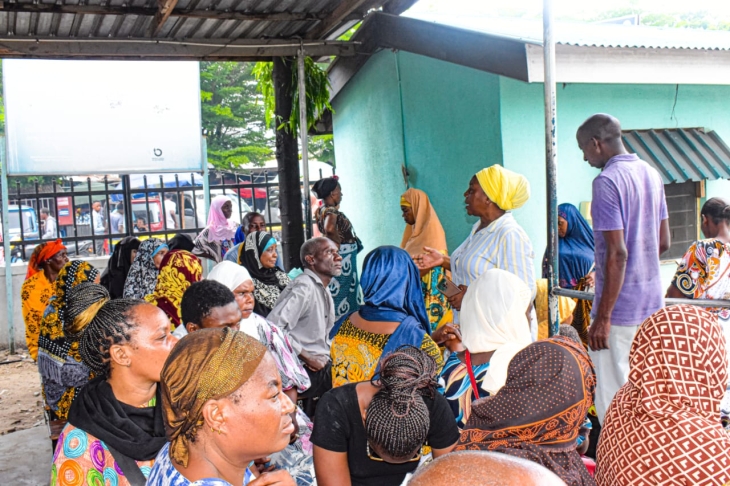
Some women at the waiting bay of Temeke Regional Referral Hospital before entering the doctor's room to receive services.
to open communication and dignified treatment.
Asha’s story highlights a pressing challenge embedded within Tanzania’s healthcare system: the gender imbalance in medical staffing and its consequences on women’s access to quality, respectful healthcare.
Across the globe, women play a pivotal role in health services, but their contributions are often undervalued or overlooked in official data. According to a 2023 World Health Organization (WHO) report, women make up 67% of the global paid health and care workforce, yet they perform a staggering 76% of all unpaid care work. This imbalance undermines not only economic equity but also the effectiveness and inclusiveness of healthcare systems.
Ministry of Health, Community Development, Gender, Elderly, and Children has made gender equity a national priority through its Health Sector Strategic Plan (HSSP V). Still, data reveals a persistent gender gap. According to the Tanzania Human Resources for Health Country Profile (2021), only 34% of medical doctors in the country are women. This disparity becomes even more pronounced in specialized fields such as surgery and internal medicine.
 Some women at the waiting bay of Temeke Regional Referral Hospital before entering the doctor's room to receive services.
Some women at the waiting bay of Temeke Regional Referral Hospital before entering the doctor's room to receive services.
This gender gap is more than a workforce statistic it directly affects how women experience healthcare, Real Lives, Real Impact Asha’s discomfort is echoed by others across the country.
Asha’s discomfort is echoed by women across the country. Rehema Charles, a 32-year-old mother of two living in Kibaha, Pwani region, faced a similar experience during a recent hospital visit. She had been struggling with persistent abdominal pain and visited a local health facility hoping for clear answers.
“I got treatment in a hospital like a month ago, but I wasn’t satisfied. The male doctor didn’t explain much, so I didn’t feel heard,” she shared.
Rehema added that she felt uncomfortable sharing intimate details of her condition with a male doctor and held back from discussing certain symptoms altogether. The result was a consultation that left her more confused than reassured, and hesitant to return unless she could be seen by a woman doctor.
Not all women feel the same way, another woman Zuhura Jessey, a 28-year-old cosmetics vendor based in Kimara, Dar es Salaam, has a different perspective on doctor gender.
“For me, I actually prefer male doctors. They go deeper in finding out the problem and give detailed advice,” she said.
Her experience highlights the diversity in patient preferences, a reminder that healthcare is not one-size-fits-all. This underscores the importance of having both male and female doctors available to accommodate the varying needs of patients.
Expert Insights.
According to medical professionals, limited gender choice in healthcare, particularly for sensitive services like reproductive health, can hinder access and reduce the quality of care.
Dr. Zaitun Bokhary, President of the Medical Women Association of Tanzania (MEWATA) and Head of Pediatric Surgery at Muhimbili National Hospital, says the roots of the gender imbalance start early.
“Girls are not always encouraged to take up science subjects or dream of becoming doctors,” she explains.
Dr. Zaitun, who regularly visits schools to mentor young girls, emphasizes the importance of role models in changing perceptions.
“I always tell them that they can be like me, they can help other women, they can also lead in this field.”
She believes that long-term investment in girls’ education, especially in science and technology, is essential to closing the gender gap in healthcare.
At the institutional level, Dr. Joseph Kimaro, Medical Officer InCharge at Temeke Regional Referral Hospital, acknowledges the challenge of balancing patient preferences with staffing limitations.
“Sometimes, yes, women patients request to be seen by female doctors, but it’s not every day, and it’s not always possible,” he says.
Temeke Hospital has taken steps to hire more female specialists, particularly in fields like obstetrics and gynecology.
“The environment we’ve created helps patients feel comfortable regardless of the doctor’s gender, but we do understand that having that option makes a difference,” he adds.
From a policymaking perspective, Dr. Grace Magembe, Chief Medical Officer at the Ministry of Health, reinforces the government’s commitment to gender-sensitive care.
“People have their own preferences, but that doesn’t mean one gender is better than the other in treatment.” she notes.
She highlights several national efforts underway: increasing the recruitment of female doctors, building better-equipped health facilities, and expanding educational programs for young girls.
“We are committed to supporting girls through education, especially in science subjects. That’s how we’ll change the numbers, not overnight, but steadily,” Dr. Magembe says.
The path forward is clear: invest in girls’ education, actively recruit and retain female medical professionals, and build healthcare systems that acknowledge the real needs of women.
The voices of Asha, Rehema, and Zuhura, alongside the insights of Dr. Zaitun, Dr. Kimaro, and Dr. Magembe, underscore an essential truth: gender matters in healthcare, not in terms of skill or capability, but in trust, communication, and comfort.
By creating systems that reflect these realities, Tanzania can build a future where no woman feels unheard, unseen, or underserved in a space meant for healing.









